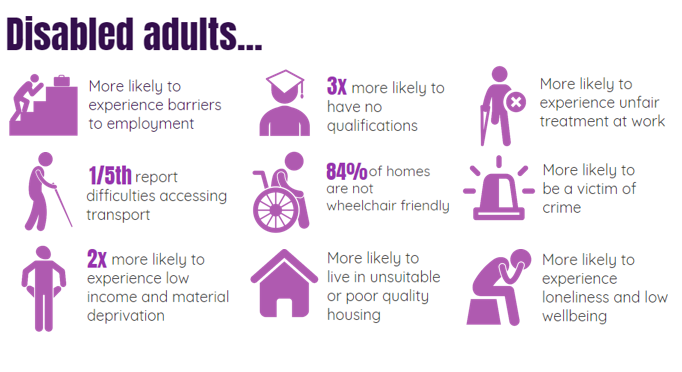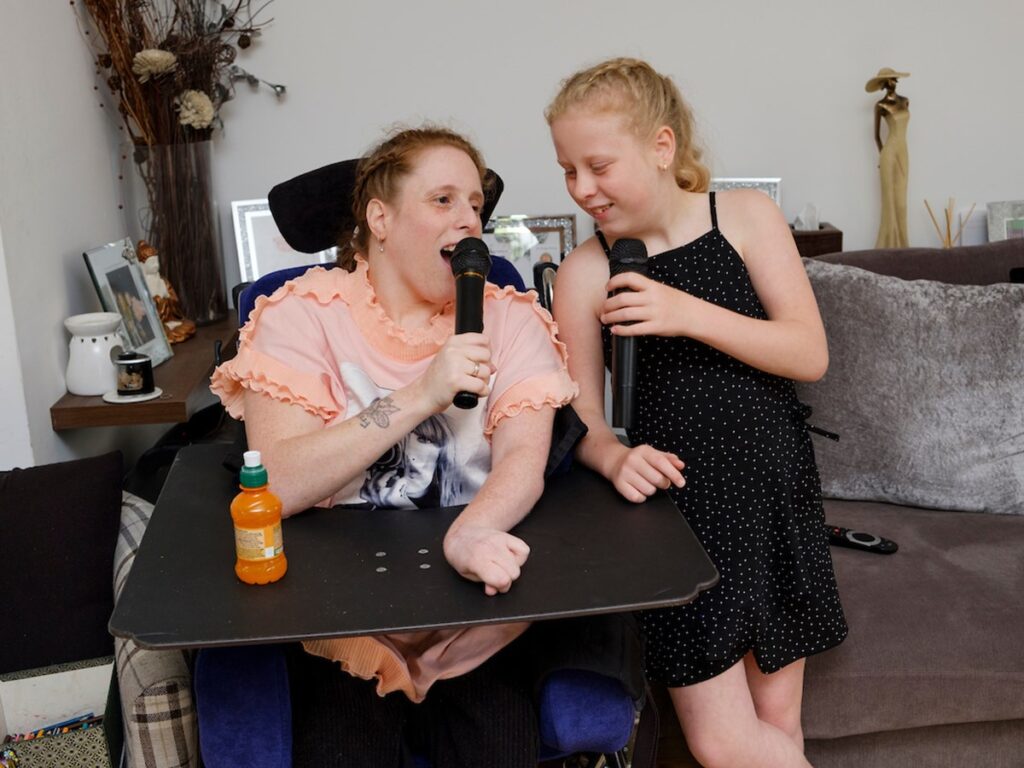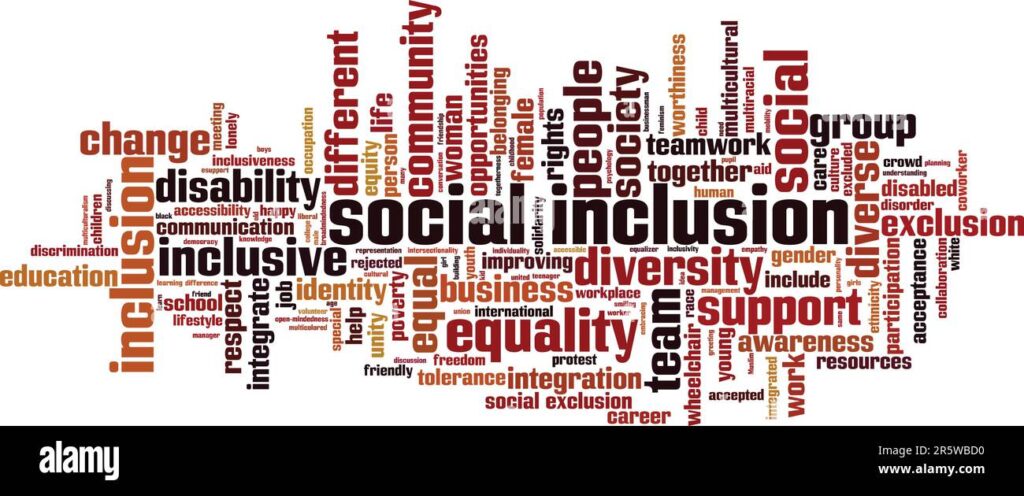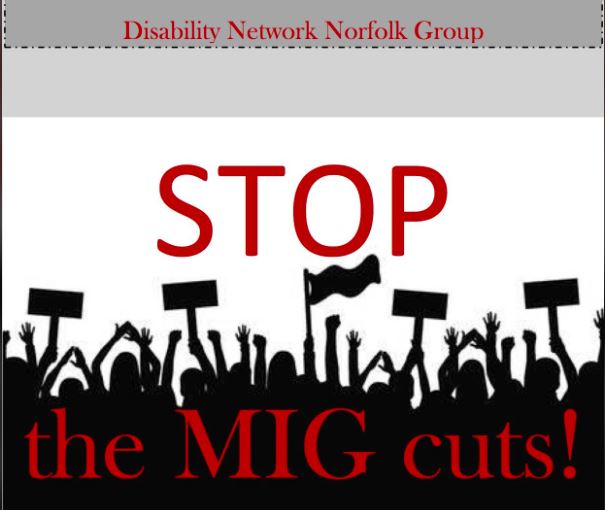Norfolk County Council Proposed changes to the Minimum Income Guarantee (MIG) For Non-Residential Care.
(Charging arrangements to meet care and support needs outside of a care home. This includes care and support received in a person’s own home, supported living/housing with care, shared lives schemes and day care).

Introduction
Norfolk County Council’s Adult Social Care Non-Residential Charging Policy outlines the financial arrangements for individuals receiving care and support outside of a care home. Following a Care Act assessment, individuals receive a care and support plan, a personal budget, and undergo a financial assessment to determine their contribution. Disability Related Expenses (DRE) may be considered to reduce costs for individuals with extra disability-related costs.
The Minimum Income Guarantee (MIG) ensures individuals have enough income for basic needs, with different rates for various age groups. There are exemptions and considerations for personal independence payments, carer premiums, and responsibilities for children. It is important that people have sufficient income for basic needs before they have to pay for care costs directly attributable to their disability or condition.
Norfolk County Council currently proposes cuts in the level of the Minimum Income Guarantee which are potentially further increasing health inequalities for this group of Norfolk residents, as well as impinge on their ability to pay for basic needs before care costs. There is also the possibility of care services becoming unviable and a reduction in the provision avialble for care across the area.
Historically, MIG cuts faced legal challenges, prompting adjustments and costs to Norfolk county council and ratepayers of around 1.2 million pounds. Currently, Norfolk County Council proposes further reductions in MIG, aiming to align rates with government standards, potentially affecting around 1600 people. Concerns arise regarding the impact of these changes, especially in light of rising living costs and the effectiveness of the DRE process.

Residents can participate in the consultation through various channels provided by Norfolk County Council. Links are available at the end of this discussion document.

Key Summary Statement
Reducing the Minimum Income Guarantee (MIG) in Norfolk will potentially have significant detrimental effects on disabled people in the region and further increase health inequalities for this sector of Norfolk for the following reasons :
- Financial Strain: For individuals already struggling with the costs associated with disabilities, any reduction in MIG increases their financial burden. These individuals may rely on the MIG to cover basic living expenses such as food, utilities, and transportation. A reduction in MIG can force them to make difficult choices between necessities, potentially compromising their health and well-being.
- Access to Care and Support: The MIG plays a crucial role in promoting independence and social inclusion by ensuring individuals have the means to meet their basic needs. Reducing the MIG may result in individuals being unable to afford necessary care and support services, leading to a decline in their quality of life and possibly forcing them into situations where they cannot access the support they need to maintain their independence. An additional impact of this could be the loss of services and support activities as it no longer is viable for them to continue with reduced numbrs of service users.
- Impact on Health and Well-being: Financial stress and insecurity can have detrimental effects on individuals’ mental and physical health, particularly for those with disabilities who may already be facing additional challenges. A reduction in MIG can exacerbate existing health conditions, increase stress levels, and contribute to feelings of isolation and anxiety.
- Legal and Ethical Concerns: Any reduction in MIG should be carefully considered in light of legal and ethical obligations to support vulnerable populations. Disability rights advocates may argue that reducing the MIG unfairly targets individuals with disabilities, further marginalizing an already vulnerable group and potentially contravening equality and human rights legislation.
- Potential for Increased Dependence: Without sufficient financial support through the MIG, individuals with disabilities may become more dependent on informal support networks or charitable assistance, placing additional strain on families and community resources. This increased dependence can limit individuals’ autonomy and ability to participate fully in society.
6. Unfair Process : During the high court judgement, it was also highlighted that the DRE process was ineffective, intrusive, inaccessible, slow and exceedingly difficult to navigate. Another example of these failings can be seen here https://cascaidr.org.uk/2020/02/22/norfolk-county-council-at-fault-for-failing-to-produce-a-clear-care-plan-and-incorrect-advice-on-direct-payments-and-disability-related-expenditure/
Overall, reductions in the Minimum Income Guarantee in Norfolk can have far-reaching and negative consequences for disabled individuals, impacting their financial stability, access to essential services, health outcomes, and overall quality of life. It’s essential for policymakers to carefully consider the implications of such changes and ensure that the needs of disabled residents are adequately met and equitable with treatment of other residents across the area. Disabled residents should not be expected to shoulder a greater burden of the cost savings for the County council than other demographic groups across Norfolk.

Norfolk County Council Adult Social Care Non-Residential Charging Policy.
The Care Act 2014 provides a legal framework for charging policy which enables a Local Authority to charge a person when it is arranging to meet their care and support needs (this is set out in sections 14 and 17 of the care Act 2014, you can view this here https://www.legislation.gov.uk/ukpga/2014/23/contents/enacted ).
Norfolk County Council’s charging policy for non-residential care came into effect on the 1st April 2015 (the most recent version Adult Social Care Non-Residential Charging Policy 2023 can be accessed here https://www.norfolk.gov.uk/media/18623/Adult-Social-Care-Non-Residential-Charging-Policy-April-2021/pdf/79Norfolk_County_Council_Adult_Social_Care_Non_residential_Charging_Policy_April_2023.pdf?m=1706868870220 ) This policy covers care and support received in a person’s own home, supported living/housing with care, shared lives schemes and day care.
Those who have been deemed eligible for support following a Care Act assessment (care needs assessment) will receive a care and support plan, indictive personal budget and a financial assessment. They can submit a disability related expenses (DRE) claim form for consideration and will receive a final personal budget once these have all been reviewed.
For information on who is eligible for help under the Care Act please look here https://www.norfolk.gov.uk/41839

Financial Assessment
Norfolk County Council will carry out a finical assessment to determine what a person can afford to pay. The financial assessment looks across all of a person’s assets both in capital and income. It will not consider a partner or spouses finances; however, it will require information on any savings or capital held in joint names.
There is an upper capital limit of £23,250, for those who go above this upper limit and have ask Norfolk County Council to arrange their care and support, Norfolk County Council may charge an admin fee to cover their costs. This will be a fixed rate fee and cannot be higher than the cost Norfolk County Council incur in making the arrangements.
The lower capital limit is £14,250, where a person’s resources are below this limit, they will not contribute to the cost of care from their capital and their contribution will be biased on their income only.
Those with capital between the upper and lower limit will be charged £1 per week for every £250 between the two amounts this is known as ‘savings income’.
In some circumstances Norfolk County Council may choose to carry out a ‘light-touch’ financial assessment. These circumstances tend to be if the person is above the upper capital limit, where charges are small or nominal and that person would clearly have relevant minimum income and when an individual is on benefits which demonstrate that they would not be able to contribute to their care and support costs.
You can see more about paying for care here https://www.norfolk.gov.uk/article/41796/Will-I-have-to-pay-for-my-care

Disability Related Expenses (DRE)
Disability Related Expenses (DRE) are extra costs that a person may have to pay because of their disability or care need. DRE only relates to non-residential care and to people who have been assessed to contribute to the costs of their care. Norfolk County Council may allow these costs as part of the financial assessment for non-residential care which could reduce the amount the person needs to pay.
DRE claims are looked at on an individual basis rather than a blanket approach and decisions are made at Norfolk County Councils discretion. Examples of what Norfolk County Council might consider as a DRE expense are community alarms, increased energy/utility costs (anything higher than the national average based on income group), cleaning, gardening, disability equipment and its maintenance costs. The cost of disability related equipment will be spread out over what Norfolk County Council considers to be the lifecycle for that item. For example, the cost of a mobility scooter could be spread over 156 weeks. Norfolk County Council will not consider any items they feel should be provided by the NHS, policy states that this includes podiatry for diabetes patients, peripheral arterial disease and rheumatoid arthritis, wheelchairs, specially made boots and shoes etc.
Norfolk County Council will ask 5 key questions when considering a DRE claim:
Do you receive disability benefits?
Is the expense necessary?
Is the expense reasonable?
Is the expense directly linked to the person’s disability, medical condition or care need?
Is the expense able to be met by any other means?
You can see more about disability related expenses here https://www.norfolk.gov.uk/article/41872/What-are-disability-related-expenses.
Norfolk County Councils – DRE Case Study – Ms Smith
Ms Smith is a 42-year-old woman who lives alone in a privately rented flat. She has mental health issues including bipolar disorder and anxiety. She can have both depressed and manic episodes and has a pendant alarm which she can use if she becomes overwhelmed. Because of her anxiety, she does not leave the house often and her family do not live locally. Ms Smith maintains contact with her family by using her smart phone to video-call with them regularly. Ms Smith receives Personal Independence Payments and has a weekly income of £275. Ms Smith has claimed for the following items and amounts:
Pendant alarm – £185 per year
Electricity costs – £65 per month
Water costs – £90 per quarter
Mobile phone – £25 per month
This means that Ms Smith’s DRE amount is:
Pendant alarm – £3.56 per week – £185 per year divided by 52 weeks.
Electricity costs – £3.80 per week – The average weekly cost of electricity for someone with Ms Smith’s income level is £11.20 and because this is lower than what Ms Smith pays the difference can be allowed.
Water costs – £0.00 per week – The average weekly cost of water for someone with Ms Smith’s income level is £8.50 per week and as this is higher than what Ms Smith pays, there is no amount to be allowed as DRE.
Mobile phone costs – £0.00 per week – Not normally allowed as DRE but because Ms Smith is socially isolated, the DRE Team could contact a social worker to see if the cost of the mobile phone could be included as part of the package of care.
Total DRE amount allowed – £7.36 per week
You can view the full case study with the breakdown of Norfolk County Councils decision here https://www.norfolk.gov.uk/article/41885/Case-study—Ms-Smith

Minimum Income Guarantee (MIG).
People receiving non-residential care have a minimum income guarantee (MIG) every week to pay for their day to day living needs such as heating, lighting, water, food, insurance and anything else they need for their home. The purpose of the MIG is to promote independence, social inclusion and ensure that the cared for person has enough to meet their basic needs. The MIG from 10th April 2023 is as follows:
£214.35 per week for people over state pension age.
£187.13 a week for people aged 18 to state pension age.
Rent, Mortgages and council tax cost are allowed on top of the MIG after any housing benefit or council tax support.
- Personal Independence payments (PIP) Mobility rates are disregarded from financial assessment, but daily living is included.
- If the person being cared for is also a carer themselves and receives carer premium/carer allowance of universal credits the carer premium will be disregarded plus a 25% buffer as additional MIG.
- If the person being cared for is responsible for a child an additional £94.90 a week will be disregarded in respect of the child. ‘Child’ is defined as under the age of 16 or up to their 20th birthday if still in relevant education and the person is still receiving child benefit/child tax credits.

Minimum Income Guarantee (MIG) cuts under the current Norfolk County Council proposals.
On the 19th February 2024 Norfolk County Council launched a consultation attempting too yet again reduce the MIG for non-residential care charges, this will run until the 17th May 2024 and will be presented to the cabinet in July 2024.
Norfolk County Council are proposing two options:
- Option 1: Reduce the Minimum Income Guarantee for people 18-years-old to pension age from the current Norfolk County Council rate of £187.13 to government rates for 25-year-old to pension age, which is currently £171.75
- Option 2: Reduce the Minimum Income Guarantee to the government rate of £171.75 for people aged 25 to pension age, and also introduce a reduced rate for people aged 18 to 24 of £150.25.
Norfolk County Council state as an estimate that option 1 would affect 1600 people who might have to pay between £2.50 and £18.00 a week more for their care. Option 2 would see around 95 18-24-year-olds pay between £2.50 and £40.00 more per week for their care, and around 1505 people between 25 – pension age pay an additional £2.50 to £18.00 a week. The measures are part of £41.5m of savings that Norfolk County Council needs to make to balance its budget for 2024/25. The changes would add between £1.2m and £1.29m in additional income for Norfolk County Council’s adult social care services.
Full information can be found here https://www.norfolk.gov.uk/article/56781/Have-your-say-on-proposed-changes-to-non-residential-adult-social-care-charging-policy
Minimum Income Guarantee (MIG) previous cuts and legal outcomes.
In 2018 more than 160,000 people in the UK had consequential social care debts and over 78,000 were under debt management by their council.
In 2019 Norfolk County Council made the decision to reduce the MIG for people aged 18 to pension age from £189 per week to £165 per week, they also took an extra £9 of the enhanced element of personal independence payments into account during the finical assessment. In April 2020 it changed again to £151.45 a week.
The Norfolk County Council suggested this would save £4m and stated it was bringing charges in line with other authorities.

However, a legal challenge launched by a young women with down’s syndrome went all the way to high court. The judge ruled that Norfolk County Council had acted unlawfully and had discriminated against them in an unforeseen and unintended way. This cost the Council £210,000 in legal fees, the decision was made to revert back to the July 2019 pay of £165 a week and used discretion not to take into account any enhanced personal independence payment. This created a back pay to over 3,200 people with severe disabilities who had been affected, costing the council around £1m. More information on this case can be seen here https://www.lukeclements.co.uk/high-court-social-care-charging-judgment-2/
Discussion Points
- Norfolk County Council state that this will bring Norfolk’s MIG in line with other councils, However it has not mentioned any change in how they work their DRE and financial assessments to bring them into line with the other councils. For example, Suffolk County Councils DRE provides a minimum of £25 and will further consider any expenses above this.
- Even though the mobility rate of PIP is disregarded for financial assessment weekly care amounts for many people full way above the maximum that can be received in disability benefits, they are therefore subsidising their care from benefits which are meant to contribute to living expenses.

- Due to the cost-of-living rising benefits are due to receive an inflation rise in April 2024 to help people to meet their basic needs. Universal credit, Personal independence payments, Attendance allowance, carer’s allowance, Employment and support Allowance, Jobseeker’s allowance, Disability Living allowance, incapacity benefit, Income support, Maternity allowance and pension credit (savings credit portion) will all increase by 6.7%. Pension credit (guaranteed credit portion) will increase 8.5%. Is this rise likely to be added to what a person is expected to contribute, therefore will not support people with the rising cost of living as was intended but result in a greater percentage of their income being used for care costs and not basic need costs.
- During the high court judgement, it was also highlighted that the DRE process was ineffective, intrusive, inaccessible, slow and exceedingly difficult to navigate. Another example of these failings can be seen here https://cascaidr.org.uk/2020/02/22/norfolk-county-council-at-fault-for-failing-to-produce-a-clear-care-plan-and-incorrect-advice-on-direct-payments-and-disability-related-expenditure/
- Norfolk County Council state that this will bring Norfolk’s MIG in line with other councils, However it has not mentioned any change in how they work their DRE and financial assessments to bring them into line with the other councils. For example, Suffolk County Councils DRE provides a minimum of £25 and will further consider any expenses above this. NCC already pays less than this on DRE payments.
- Even though the mobility rate of PIP is disregarded for financial assessment weekly care amounts for many people full way above the maximum that can be received in disability benefits, they are therefore subsidising their care from benefits which are meant to contribute to increased living expenses resulting from their disability or condition.
- Due to the cost-of-living rising benefits are due to receive an inflation rise in April 2024 to help people to meet their basic needs. Universal credit, Personal independence payments, Attendance allowance, carer’s allowance, Employment and support Allowance, Jobseeker’s allowance, Disability Living allowance, incapacity benefit, Income support, Maternity allowance and pension credit (savings credit portion) will all increase by 6.7%. Pension credit (guaranteed credit portion) will increase 8.5%. Is this rise likely to be added to what a person is expected to contribute. If so then this will not support people with the rising cost of living as was intended, given they will have to contribute more of their care costs and not have the additional funds for basic needs.
- During the high court judgement, it was also highlighted that the DRE process was ineffective, intrusive, inaccessible, slow and exceedingly difficult to navigate. Another example of these failings can be seen here https://cascaidr.org.uk/2020/02/22/norfolk-county-council-at-fault-for-failing-to-produce-a-clear-care-plan-and-incorrect-advice-on-direct-payments-and-disability-related-expenditure/

How to take part in the consultation.
Norfolk County Council state they have sent letters and questionnaires to everyone who would be impacted by these changes.
There are several ways to take part in the consultation:
- Online questionnaire available at https://norfolk.citizenspace.com/
- Online at www.norfolk.gov.uk/savingsproposals
- By email at haveyoursay@norfolk.gov.uk
- By post, writing to:
The Minimum Income Guarantee Consultation 2024/2025.
Freepost Plus RTCL-XSTT-JZSK
Norfolk County Council,
Ground floor – south wing,
County Hall,
Martineau Lane,
Norwich.
NR1 2DH.
If support is required contact can be made to charging.policy@norfolk.gov.uk or calling 01603 306864 open Mon-Fri 8:30am till 5:00pm.
Appendix 1 Case Studies of Peoples MIG Calculations
Example of a cared-for person who receiving income as one of a couple:
Jarred is 47 and receiving support at home and has been placed in the Support
Group of Employment and Support Allowance (ESA). He lives with his wife, Susan,
who has Contribution-Based ESA of £129.50 per week and an underlying entitlement
to Carers Allowance. Both Jarred and Susan receive Enhanced Rate Daily Living
Personal Independence Payment (PIP) of £101.75 each and Enhanced Rate PIP
Mobility of £71.00 per week. (PIP Mobility is disregarded from the financial
assessment)
Their couple Employment and Support Allowance appropriate amount is £328.85 per
week, which includes the couple’s personal allowance of £133.30 per week, 2x
Severe Disability Premium (£152.80) per week and 1x Carers Premium (£42.75) per
week.
Jarred receives £199.35 per week Income-related ESA for both himself and Susan.
Jarred’s share of the ESA is determined by dividing the amount of Income-related
ESA amount in half, e.g. £199.35/2 equals £99.67
Jarred’s maximum contribution is calculated as follows:
Income-related ESA £ 99.67 (half the total)
PIP Daily Living Component £ 101.75
Total £201.42
Less
Minimum Income Guarantee £187.13
PIP disregard £ 33.65
Maximum Weekly Contribution £ NIL
If Susan is receiving care and support at home, her contribution would be:
Contribution ESA £129.50
Income-related ESA £ 99.67 (half the total)
PIP Daily Living Component £ 101.75
Total £330.92
Less
Minimum Income Guarantee £187.13
PIP disregard £ 33.65
Maximum Weekly Contribution £110.14
Example of a cared-for person who is not receiving income as a couple:
Cheryl, who is 67, is receiving support. She lives with her husband, Dan, who is 62.
Cheryl receives a State Retirement Pension of £203.85 per week, enhanced rate
Personal Independence Payment (PIP) daily living component of £101.75 per week
and higher PIP mobility component £71.00, plus an occupational pension of
£214.55 per week.
Dan gets standard rate of Personal Independence Payment (PIP) Daily Living of
£68.10 per week, the enhanced rate PIP mobility of £71.00 per week and a small
occupational pension of £20 per week.
Cheryl and Dan’s two children each receive Carer’s Allowance for looking after their
parents.
Cheryl’s ‘qualifying income’ (QI) of £418.40 per week and Dan’s QI of £20 per week
plus, the fact that someone gets Carers Allowance for looking after both of them
means their income is too high for Pension Credit.
The applicable couple personal allowance is £306.85 per week.
Cheryl’s maximum contribution is calculated as follows:
State Retirement Pension £203.85
Occupational Pension £214.55
PIP Daily Living £ 101.75
Total £520.15
Less Minimum Income Guarantee £214.35
PIP disregard £ 33.65
Maximum Weekly Contribution £272.15
*PIP mobility is disregarded in a financial assessment.
However, NCC needs to consider the implications of Cheryl’s care charges on Dan
and make sure the couple receive at least the Pension Credit couple’s personal
allowance of £306.85 per week.
NCC has already disregarded £214.35 of Cheryl’s income and also all of Dan’s
‘qualifying income’, giving a total disregard of £234.35 per week. This is less than
the basic couple’s Personal Allowance of £306.85.
Therefore, NCC will make a ‘Spouse Disregard’ of £72.50 per week to bring the total
disregarded ‘qualifying income’ up to the couple’s Personal Allowance.
Cheryl’s revised Maximum Weekly Contribution is: £272.15
Less Spouse Disregard £ 72.50
TOTAL £199.65
Credits
Thank you to Jenna Bedwell for her help and support in putting this document together and valuable insight as a wheelchair user and advocate for those facing health inequalities on how these proposals will impact on disabled people’s lives. Thank you for what you do on a personal level.
